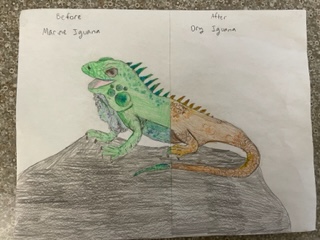The Iguana’s habitat in the future will change by the rising temperatures in the ocean which leads to starvation and overheating. Iguanas starve because according to https://www.nhm.ac.uk/, warmer water leads to the disappearance of the red and green algae that marine iguanas prefer. The amount of brown algae increases, but lizards can’t easily digest this and it may even be toxic to them. This reduction to food causes the animals to die by starvation, with the larger iguanas more at risk. These vertebrates may adapt in the future to these new changes by passing down traits that help them survive with the new changes, such as developing short, rounded snouts and razor sharp teeth that make it easy to scrape algae off of the rocks. Iguanas may adapt to have flattened tails to make them excellent swimmers and the dark color of their skin can help absorb heat.
Contact us
Thank you for your interest in contacting Future Engineers. We look forward to connecting with you!
General Inquiries
support@futureengineers.orgSponsorship Inquiries
sponsor@futureengineers.org
